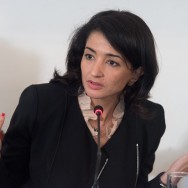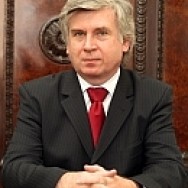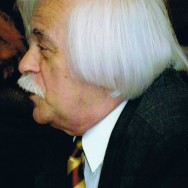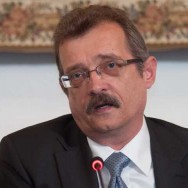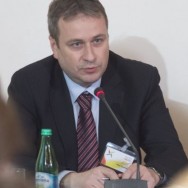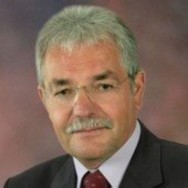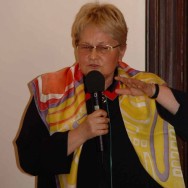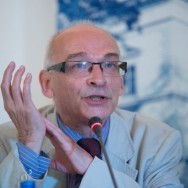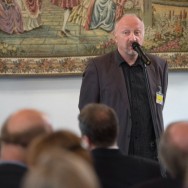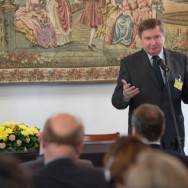Jeannette Bougrab is a French lawyer and politician. She served as the junior minister for Youth and Community Life from 2010 2012 and is a member of the UMP party. Prior to this, she was the Chair of the French Equal Opportunities and Anti-Discrimination Commission (HALDE) from 16 April 2010 to 14 November 2010. Jeannette Bougrab received a Masters (DEA) in Law from the University of Orléans and completed a PhD in Public Law from the Sorbonne in Paris as well as a Masters (Magistère) in Economics Law. She has been an associate Professor of Law at Institut d'Études Politiques de Paris and the Sorbonne. She served on the Board of Directors of the Union pour un Mouvement Populaire (UMP) until 2007. She has been a member of the Haut Conseil à l'Intégration, the Administrative Board of the Arab World Institute (AWI) and the diversity oversight of the Conseil supérieur de l'audiovisuel (CSA). In 2010, she also became Chair of the Administrative Board of the Agence pour la Cohésion Sociale et l'Egalité (ACSE). She has been a member of National Council of France. She is also a writer and film director.
Experts - politics
Kazimierz Bujakowski
Mr. Bujakowski completed a Masters in Geodesy and Cartography, while he also holds a Ph.D. in Technical Sciences. During the period between 1997-2001 he finished Postgraduate studies in Business Administration at the Business and Management School of the Economic Academy in Krakow. Deputy Mayor of the City of Krakow since 2004, he is currently in charge of spatial development of the city.
Tamás Katona
Ambassador of The Republic of Hungary to Poland (2000-2002). Professor of history and politician. 1998-2000 professor and lecturer at Károli Gáspár Protestant University, Budapest. 1990-1998 Member of Parliament (Hungarian Democratic Forum, Hungarian Democratic People's Party). 1990-1992 Secretary of State for Foreign Affairs. 1992-1994 Secretary of State, Prime Minister's Office.
Robert Kiss
Mr. Kiss served as Ambassador of the Republic of Hungary to Poland for over five years from 2007 through until 2012. He graduated from the Faculty of Diplomacy, Moscow State Institute for International Relations in 1985; as an economist. In 2004 he took an advanced qualifying examination in Public Administration – foreign and security policy. He has cooperated with many universities: Budapest School of Politics, Kodolányi János College, Debrecen University and Katholieke Hogeschool Kempen (Belgium). He has worked for Hungarian Ministry of Employment and Labour as deputy director-general, Office of the Minister without portfolio-president.
Peter Kormúth
Deputy Head of the Mission of the Slovak Republic to Poland. Graduated from the Faculty of Philosophy and the Institute of International Relations of the Comenius University (Law Faculty) in Bratislava. Joined the Ministry of Foreign Affairs of the Slovak Republic in 1993, held different posts in Ministry (Director of the Department of OSCE, Council of Europe and Disarmament, Deputy Director of the Department of Human Rights) and abroad (Deputy Head of Mission, Embassy of Slovakia to Belgium and Luxembourg, Deputy to the Permanent Representative, Mission to the Council of Europe, Strasbourg.)
Stanisław Kracik
Voivode of Małopolska Region since 2009, politician. Graduated from the Faculty of Electrical Engineering at the University of Science and Technology in Krakow. He also obtained a Master of Public Administration degree at the Malopolska School of Public Administration, organized in the cooperation with the Copenhagen Business School. He worked in Cracow Measuring Apparatus Factory as a designer, manager and chief designer. In the years 1990–2009 he was a Mayor of Niepołomice. In the years 1993–2001 he served as Deputy to the Polish Sejm (the lower chamber). He worked in the Finance Committee and the Public Committee on social policy. Stanisław was a candidate for Mayor of Krakow in the 2010 local elections, but was eliminated in the second round.
Barbara Labuda
Secretary of State in the Chancellery of the president of the Republic of Poland (in charge of social and cultural affairs). Active in politics since 1968, cooperated with KOR (Comitee for the Defence of Workers), active in the "Solidarity" Union. Co-founder of the ROAD (Civic Movement - Democratic Action), Democratic Union, Union for Freedom. Since June 1989, deputy to the Sejm, head of the Parliamentary Group of Women. President of the "No Dogma Association for Law and Freedom" and member of the Programme Council of the Foundation for Promotion of the European Law.
Jan Lityński
Participant of the students' manifestations in March 1968, for which he was sentenced to two and a half years in prison. In 1976, he became co-founder of the “Information Bulletin”, the first uncensored Polish magazine. In 1977, he was a co-editor of “The Worker”, an independent magazine advocating the formation of free trade unions. A member of the Committee for Social Self-Defence of the Workers' Defence Committee, he cooperated with the Intervention Office of the Committee for Social Self-Defence of the Workers' Defence Committee. In 1980, he was an advisor for the “Solidarity” Independent and Self-Governing Trade Union. In 1981, when martial law was in force, he was arrested. After escaping while on leave from prison he joined the “Solidarity” underground movement, during 1984, he became a member of the Regional Executive Committee of the “Solidarity” Independent and Self-Governing Trade Union, Mazowsze Region. In 1989, he was elected to Sejm from the wałbrzyskie voivodship. Between 1989 and 2001 he was a deputy to the Sejm, he was, among others, a chairman of the Social Policy Committee and the Intelligence Committee. Since 1990 in the Citizens' Movement for Democratic Action (ROAD), then in the Democratic Union and the Freedom Union (vice-chairman). He was an author of publications in the Polish and foreign press, among others in “The Criticism”, “Plus”, “Mazowsze Weekly”, “Res Publica” and other uncensored magazines before 1989. He was published in the Polish and foreign press after 1989, among others in “Gazeta Wyborcza”, “Rzeczpospolita”, “Dziennik”, “Polityka”, “Newsweek”, “Zeszyty Literackie”. Book publications include, among others: “The Polish Peasants' Party 1945-47 – a resistance model”, “Solidarity – problems, question marks”. He was honored with the Commodore's Cross of the Order of Polonia Restituta and the Commodore's Cross with the Star. Currently an advisor for Polish President Bronisław Komorouski on issues relating to political parties and political environments.
Zbigniew Machej
Freelance writer, translator of both Czech and Slovak and a journalist. Currently Deputy Director of the International Visegrad Fund, he has had a long career working throughout the Visegrad countries. Educated in Krakow, where he completed a Masters of Arts in Comparative Religion. Following on from the completion of his Master's, he briefly thought Polish literature for a few years, before becoming Deputy Director of the Polish Institute in Prague in 1991. Since then, he has spent his time between helping organise Krakow's hosting of the European capital of culture in 2000, and returning to the Polish Institute in 2000. After leaving the institute again in 2004, he spent a couple of years focusing on journalism and writing. In 2006, Mr. Machej became Director of the Polish Institute in Bratislava where he remained until 2010.
Jerzy Miller
Educated at AGH University of Science and Technology in Krakow, graduating from the Faculty of Electrical Engineering, Electronics and Automatics. Ever since 1990 his professional involvement has been one with public administration. He held the position of Director of the Organization and Supervision Division, and also he served as Director of the Małopolska Province Office in Krakow. Between 1993-1998 he worked as Vice-Governor of the former Kraków Province. From 1998 he was Undersecretary of State, and then Secretary of State in the Ministry of Finance, later to be appointed Government Plenipotentiary for Decentralization of Public Finance. In 2001-2003 he acted as advisor to the President of the National Bank of Poland. In 2003, he was appointed President of the Agency for the Restructuring and Modernization of Agriculture. He held the post of Director of the Department for Social Communication of the National Bank of Poland and in 2004 he went on to act as a Member of the Management Board of the NBP. Between 2004-2006 he performed his function as President of the National Health Fund. From 2006 he was Deputy Mayor of the City of Warsaw. Between 2007 and 2009 he served as the Governor of the Małopolska Province. From 2009 he was Minister of the Interior and Administration. In 2012 he was appointed Governor of the Małopolska Province for the second time.

